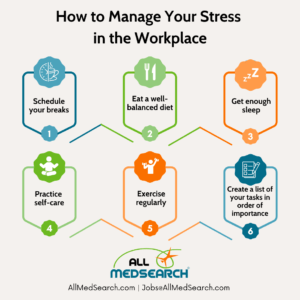
Feeling stressed at work and do not know how to handle it? Unsure about what can help alleviate your issues? Is your mind somewhere else while trying to focus on tasks at work?
According to a Gallup poll, workers’ daily stress has reached a record high, increasing from 38% in 2019 to 43% in 2020. While every position has to deal with some level of stress – daily stress levels should not reach highs like this.
High levels of stress has terrible long-term side effects on employees. Some common long term effects of high stress levels include:
- Headaches
- Anxiety
- Depression
- Low Productivity
- Digestive problems
- Muscle tension and pain
- Heart disease, heart attack, high blood pressure, and stroke
- Sleep problems
- Weight gain
In this article, we will discuss some easy ways to help manage your stress in the workplace.
Tip 1: Schedule Breaks
It is very easy to forget to take a break while working. Scheduling your breaks can help you remember to take a step back and take your mind off of what is stressing you out.
Remember to make time for yourself throughout the day. Leaving your desk, office, etc. for a few minutes can help clear your mind and help you recharge. When you come back, you can be more productive and energized.
Tip 2: Eat a Well-Balanced Diet
Be sure to include plenty of fresh fruits and vegetables and water. Eating regularly, packing healthy snacks, and water can help reduce the temptation of unhealthy options at work. Eating a well-balanced diet will help keep you more energized throughout the day and help prevent afternoon energy crashes.
Tip 3: Establish Boundaries
Establishing work-life balance boundaries for yourself can be a difficult task – but a necessary one. It is easy to feel pressured to be available 24/7 – especially if you are working remotely. Establishing boundaries can look different for everyone. A good place to start might be to making a rule not to check email from home in the evening, or not answering the phone during dinner.
Tip 4: Get Enough Sleep
Try to get at least 8 hours of sleep each night if possible. A great place to start if you are having trouble sleeping is to limit your caffeine intake in the afternoons.
Tip 5: Practice Self Care
The American Nurses Association Code of Ethics states that nurses must practice self-care as well. According to the ANA, there are seven areas of self-care that a nurse needs to practice. These seven areas of self-care are mental, physical, emotional, spiritual, social, personal, and professional. Check out our other blog Why Self-Care is Necessary for Nurses for more self-care tips!
Tip 6: Exercise Regularly
Exercise has some great stress-busting benefits. Physical activity helps boost your endorphins and can help improve your mood, and your well being.
You do not need to go to the gym to get these benefits. Start things slow by taking a 30-minute walk around your neighborhood or workplace to start boosting your endorphins!
Tip 7: Create a List of Your Tasks in Order of Importance
Breaking down your tasks into smaller and more manageable tasks can make them seem less daunting. Try making a checklist of all of the tasks you have for the day. Breaking up a large task into smaller items can help you see the big picture.
All Med Search offers tons of resources to help you throughout your job search. Talk to us today to find you a job that will help you achieve the next step in your career goals. Marni@AllMedSeach.com
